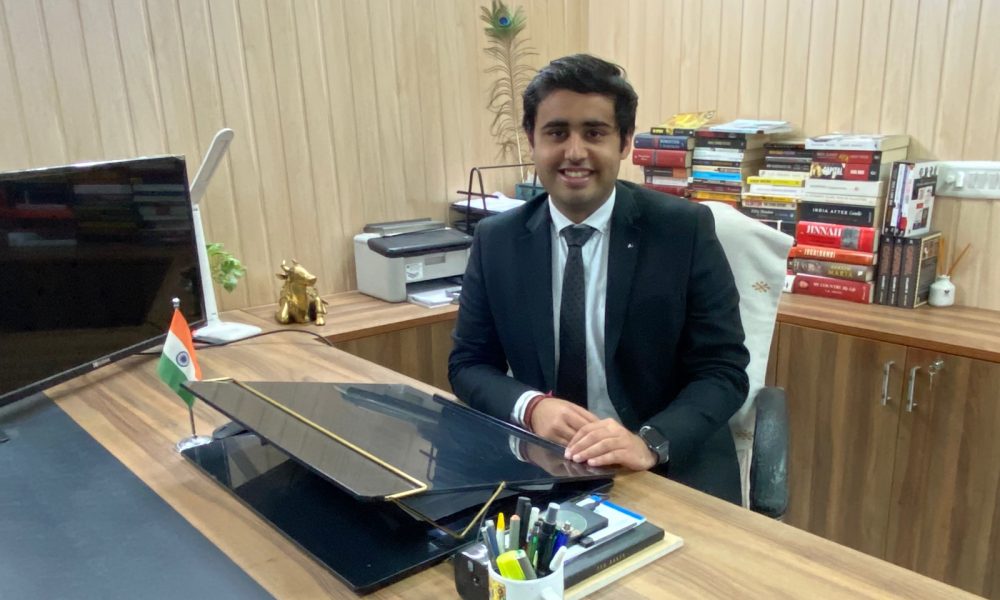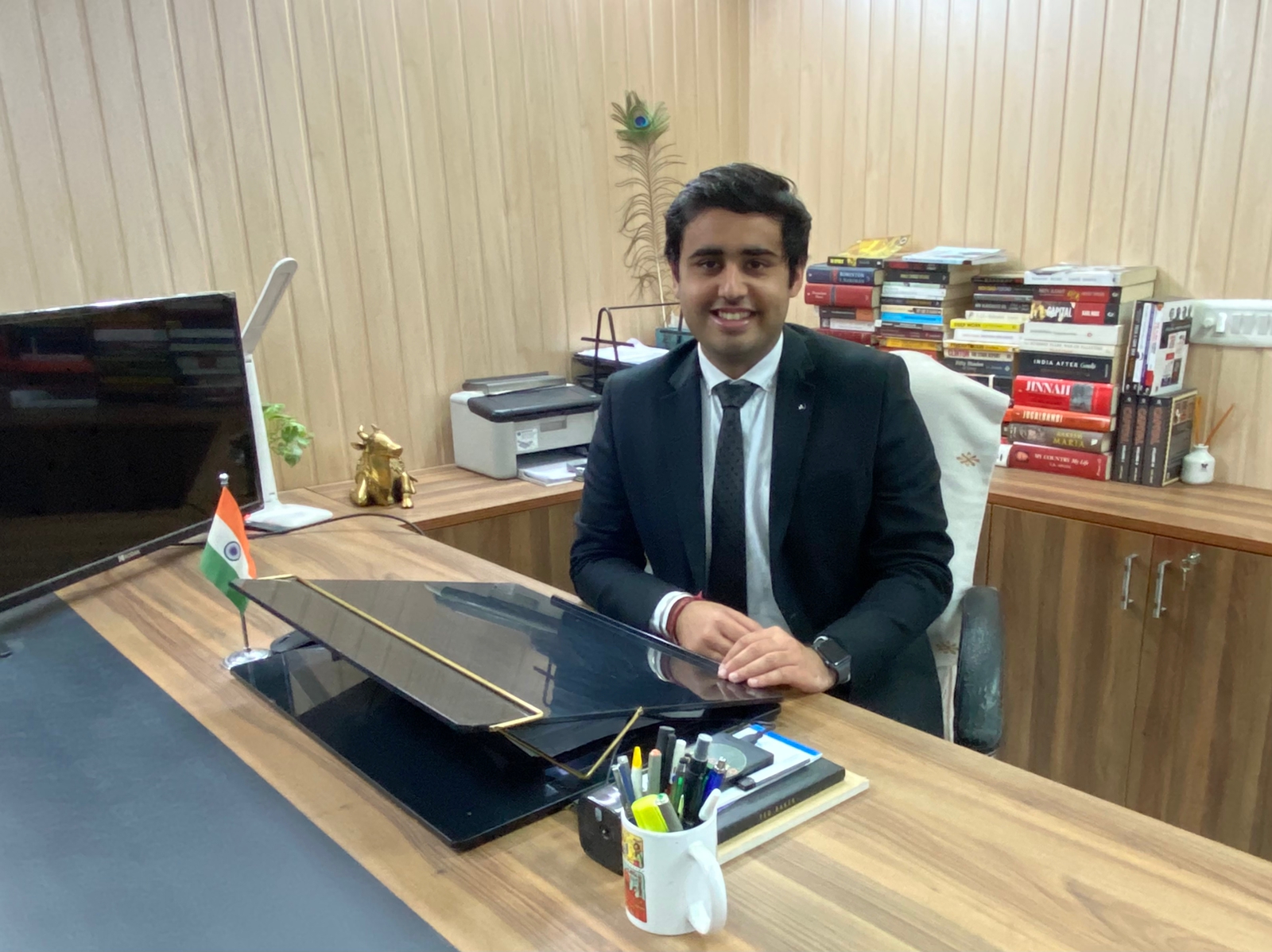This interview has been published by Prabhjot Singh, Priyanka Karwa and The SuperLawyer Team

What was your motivation behind choosing law as a career?
Growing up in a family of doctors, I was surrounded by medical professionals and it was expected that I would follow in their footsteps by pursuing a career in medicine. However, as I progressed through my education, I began to have doubts about whether that was the right path for me. In my ninth grade, I developed the habit of reading the newspaper and became interested in the impact of law on our daily lives by reading articles and editorials. Additionally, I have always been drawn to challenges and the idea of making a name for myself in a unique field.
By the end of my tenth grade, I had made the decision to pursue a career in law, despite the surprise of those around me. I chose commerce instead of biology and started my Law School preparations. Fortunately, my parents were incredibly supportive of my choice to study commerce after completing tenth grade and pursuing Law as a career.
What were the challenges that you faced in the beginning of your career?
The legal industry is known to be challenging and dynamic, especially for first-generation lawyers who are just starting out. When you embark on a career in law, you often have to start from scratch, building your own law firm, acquiring clients, and establishing your practice and reputation. After completing my LLM from the United Nations Interregional Crime and Justice Research Institute, I partnered with Avi Kalra to start our own law firm. While we faced many challenges in the beginning, a few stood out as particularly difficult.

One of these challenges was that, at 24 years old, many potential clients saw me as too young to handle their cases or offer sound legal advice. I had to work hard to prove myself and earn their trust, often competing with more experienced lawyers in the industry. Another major challenge was financial. In the early days of our law firm, we had to cover our running costs and basic expenses while also trying to sustain our business. The second wave of the COVID-19 pandemic made this especially difficult, I was sleeping in the office, I could not afford a place to live and I had to choose between keeping the office or getting a place to live.
Prateek, do you think that for a first-generation lawyer, the journey becomes a little difficult? Please explain the same wrt to your own experience.
Absolutely, I feel that the journey becomes a little difficult for first-generation lawyers as there are lot of factors to it. Starting with your law school days, being a first generation lawyer you’re clueless as what specialization to pursue that would be best suited for you or with finding right Internships and it becomes a difficult process to apply for Internships with reference at all. Secondly, if you plan to start your own law firm/ law practice you’re all alone out there, you have start from ground zero, you have no cases, no references, no identity of your own.
Thirdly, ‘the doubt’, since you’re the first in your family, ‘the doubt’ to work security, sustainability and expansion is always there and there’s no going back but I think being a first generation lawyer out there might be difficult process but it gives you a lifelong learning and a sense of achievement that cannot be compared to anything.
Nowadays, people don’t have that zeal to pursue a career in litigation, what can be the reason for that apart from job security in corporate?
When I conduct job or internship interviews, I often ask candidates if they are interested in joining the litigation or corporate team at the firm. More often than not, the answer is the corporate team. There are several factors that can influence a candidate’s decision to pursue corporate rather than litigation. One reason is that litigation can be like going to war, and one must be prepared for any situation.
Additionally, the practical knowledge gained through litigation is significant, but it can also be a struggle. The lack of efficient judicial infrastructure, such as outdated buildings and complicated case filing processes, can be a deterrent. Additionally, the practice of law can vary significantly from one district to another, making it difficult to navigate, for example in Delhi courts the matters are called according to the list but if you go to the Gurgaon court the list is not followed and your matter is taken up as you approach the court. Furthermore, when litigating, the burden of representation falls entirely on the shoulders of the attorney, who must ultimately represent their client in court. It is no small feat. Additionally, it is important to consider that the salaries in litigation may be lower in comparison to the amount of work and energy required. It is a demanding field that requires a significant investment of time and effort.
Prateek, What was it that kept you awake in your pursuit of success, eventually leading to you being the founder of Clergy & Wisemen?
The concept for ‘Clergy & Wisemen’ was first formulated during my third year of law school, when Avi and I won our first National Trial Moot Court Competition. However, it wasn’t until after the first wave of the COVID-19 pandemic that we decided to officially establish the law firm. We recognized that starting a successful law firm required careful planning and preparation, and so we took a break after law school to further understand the Industry and gather the necessary skills and knowledge.
During this time, I pursued a master’s degree at the United Nations and continued to meet new people and learn as much as possible about starting a law firm. The idea for ‘Clergy & Wisemen’ evolved and was refined through constant learning and experimentation. Even after starting the firm, we faced challenges, particularly during the second wave of COVID-19 when business was slow. However, we remained committed to our goals and continued to read, learn, and develop our legal processes in order to succeed.
Starting a law firm at the age of 24 with no clients was a risky endeavour, and many people did not believe in our idea. However, we were determined and clear about our goals, and we consistently worked towards achieving them. Despite the challenges and doubts, we were committed to making our vision a reality. It is important to be consistent and persistent, and to always strive to overcome any obstacles that may come your way.
Among all the specialisations, i.e., legal management, compliance, advisory and litigation, which area of law is the most interesting to you and why?
I would say Legal Management. Legal management involves managing the legal affairs of a corporate or startup entity. This includes ensuring compliance with all laws and regulations related to contracts, taxation, licenses, and more. At ‘Clergy & Wisemen,’ we provide legal management services to a variety of companies, including protecting and regulating their intellectual property, managing the contract life cycle, and handling compliance requirements. Working in the field of legal management is constantly challenging and rewarding, as there is always something new to learn. It is important to stay up-to-date with laws, regulations, and notifications, which can be particularly challenging in areas with regularly updated laws or numerous notifications, such as with the Goods and Services Tax. Additionally, legal management often involves managing litigation, providing a well-rounded experience that encompasses both the corporate and litigation aspects of law.
Prateek, how do you see the legal management sector increasing more opportunities for lawyers in coming times?
The demand for legal management services has increased in recent years with the rise of startups, as these companies and corporations aim to avoid costly disputes and litigation. Legal management ensures compliance with all relevant laws and regulations, providing a cost-effective solution for these businesses. Companies with large operations may also choose to hire in-house legal managers to handle their legal affairs. If you enjoy working with various disciplines of law, legal management is a rewarding field to consider.
How do you push through your worst times?
Starting my own law firm has been filled with ups and downs, and there are still many challenges ahead. There have been times when I have questioned myself and doubted my abilities, and it can be easy to feel consumed by these negative emotions. To get through these difficult times, I try to maintain consistency in my work and personal pursuits and focus on activities that contribute to my own growth and the growth of the firm. It is important to prioritize one’s emotional well-being, no matter what the circumstances may be. Ultimately, the key to navigating challenges is to work smart, stay consistent, and keep moving towards your goals while also taking care of your physical and mental health.
Talking about work-life balance, there has been ample amount of discussion on health issues as a lawyer, what do you believe are the best practices to maintain the equilibrium?
Maintaining balance in life is crucial, and achieving a healthy work-life balance is essential for both personal well-being and business growth. While building ‘Clergy & Wisemen,’ I lost sight of this balance and found myself working excessively long hours, leading to negative impacts on my physical and mental health and personal relationships. Recognizing the importance of balance, I made changes to my lifestyle, including waking up early, exercising, and prioritizing time for friends and family.
These efforts have had a significant impact on my overall well-being and productivity. I also try to be mindful of the number of hours we work at the firm, although there are occasionally times when additional hours are necessary. Regardless of the demands of work, I make it a priority to prioritize my physical and mental health by waking up early, staying active, and spending quality time with loved ones. This simple habit of waking up early has made a dramatic difference in my life and I highly recommend it to others. It helps to make the days feel longer and the mind feel clearer, leaving you full of energy.
Few advice for our young law professionals?
Know your goal;
Work smart, not hard;
Be consistent;
Health is always first and
Do what you love.
– PRATEEK LAKRA
Get in touch with Prateek Lakra-
























